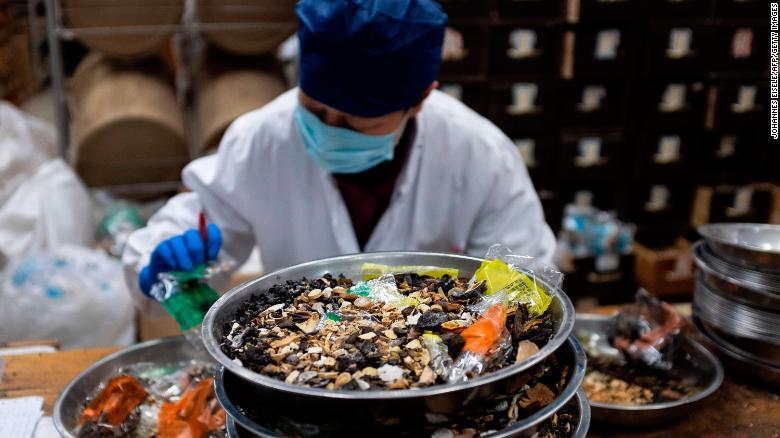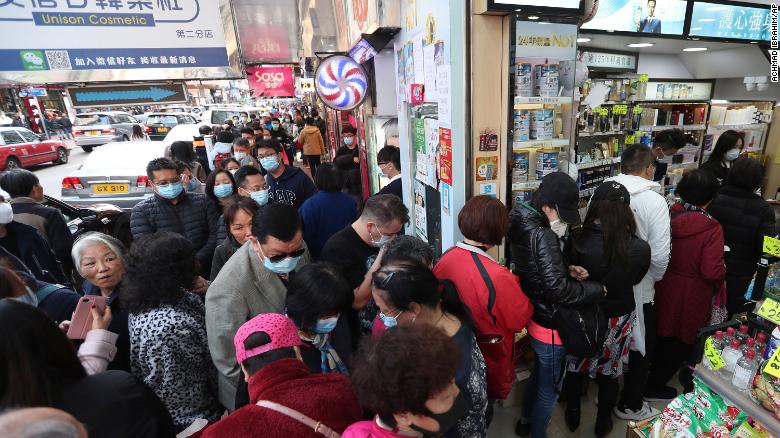Hong Kong – Could a traditional Chinese medicine help fight the Wuhan coronavirus, or is one of the country’s most influential state media outlets promoting pseudoscience and false hope?
Those were the questions dominating Chinese social media after the state-run Xinhua news agency reported Friday that the Shanghai Institute of Materia Medica and the Wuhan Institute of Virology had discovered that the Shuanghuanglian oral liquid — a popular combined herbal remedy commonly used to relieve some symptoms such as fever, cough, and sore throat — could be used to “inhibit” the deadly virus.
The news, however, was greeted with skepticism online in China, with many — including numerous medical experts — questioning whether the findings were supported by clinical evidence from treating coronavirus patients. Others wondered if this was a concerted effort to promote certain herbal products to boost their makers’ share prices ahead of the Chinese stock market’s re-opening Monday.
But many others apparently didn’t need confirmation. Posts on Weibo, China’s Twitter-like platform, purportedly showed people lining up at night outside pharmacies across China to buy Shuanghuanglian, ironically going against the authorities’ advice to avoid congregating in public. Such was the apparent demand sparked by the notice that the compound formula sold out on some stores on China’s e-commerce platform Taobao.
As of Friday, the virus had claimed the lives of more than 250 people in mainland China.

Government support
The two institutes that discovered Shuanghuanglian’s alleged ability to “inhibit” the coronavirus are both state-run bodies. The Shanghai Institute of Materia Medica is under the Chinese Academy of Sciences (CAS), a top government think tank. The Wuhan Institute of Virology is also administered by the CAS and is among the country’s most advanced virus research laboratories.
The news comes after China’s National Health Commission issued a notice on the treatment of the coronavirus on Monday, asking medical institutions to “actively promote the role of traditional Chinese medicine (TCM) during treatment.”
That notice came two days after Chinese President Xi Jinping — a well known TCM advocate — called for the “combination of Chinese and Western medicine” in the diagnosis and treatment of the disease at a meeting of the Communist Party’s Politburo Standing Committee, the country’s supreme ruling body.
In recent years, the government has heavily promoted TCM, as part of efforts by Xi to bolster the country’s health sector and fill the gaps in national insurance schemes.
It has also sought to win acceptance for TCM overseas, establishing 30 overseas TCM centers in countries along the “Belt and Road Initiative,” Xi’s global infrastructure and investment program.
Chinese patent drug containing herbal medicines Shuanghuanglian oral liquid could help contain #novelcoronavirus, according to a joint research between Shanghai Institute of Materia Medica and #Wuhan Institute of Virology. pic.twitter.com/lx4Iixk2tw
— Global Times (@globaltimesnews) January 31, 2020
The safety and effectiveness of TCM is still debated in China, where it has both adherents and skeptics. Though many of the remedies have been in use for hundreds of years, critics argue that there is no verifiable scientific evidence to support their supposed benefits.
However, in 2018, the World Health Organization (WHO) gave its long-awaited nod to include TCM in its influential book classifying thousands of diseases — its first-ever official endorsement of the ancient practice.
The recent promotion of TCM in China is also in line with Xi’s push to revive traditional Chinese culture, breaking away from the ruling Communist Party’s earlier path under late Chairman Mao Zedong, during which time elements of traditional culture were often attacked, especially during the Cultural Revolution.
At a national conference on TCM last October, Xi urged experts and officials to carry on and innovate the fine elements in TCM and underlined efforts to promote it internationally, Xinhua reported at the time.
“Traditional medicine is a treasure of Chinese civilization embodying the wisdom of the nation and its people,” Xi said at the meeting in Beijing.

State media climb down
Amid mounting public skepticism over the effectiveness of Shuanghuanglian, the ruling Communist Party’s mouthpiece, the People’s Daily, warned Saturday morning that “inhibiting does not equal preventing and treating,” reminding the public not to rush to purchase the herbal remedy, or take it without medical supervision.
“So far, the finding is still under preliminary study, and a large number of experiments is needed to test if it is effective on patients,” it said, citing the WHO in saying that no proven effective drugs to prevent or treat the Wuhan coronavirus are currently available.
The US National Institutes of Health is working on a preventative vaccine, but it will likely take a few months until the first phase of clinical trials get underway, and more than a year until a vaccine might be available, according to experts.
During the deadly SARS pandemic of the early 2000s, another traditional Chinese herbal medicine, Banlangen, made from the root of a flowering woad plant and used to treat the common cold, was sold out in many pharmacies due to a popular but clinically unproven belief that it could help prevent SARS, which is closely related to the Wuhan coronavirus.
As reported by CNN
